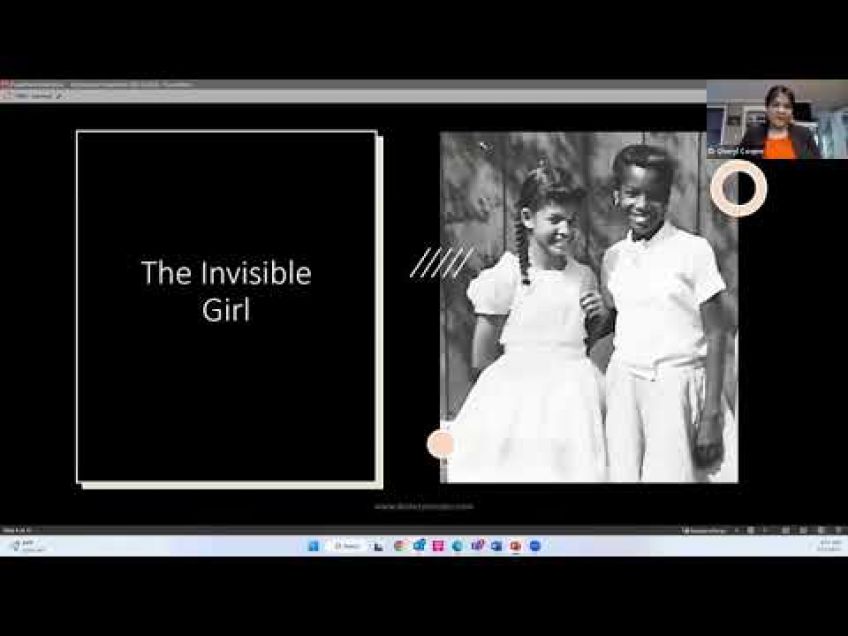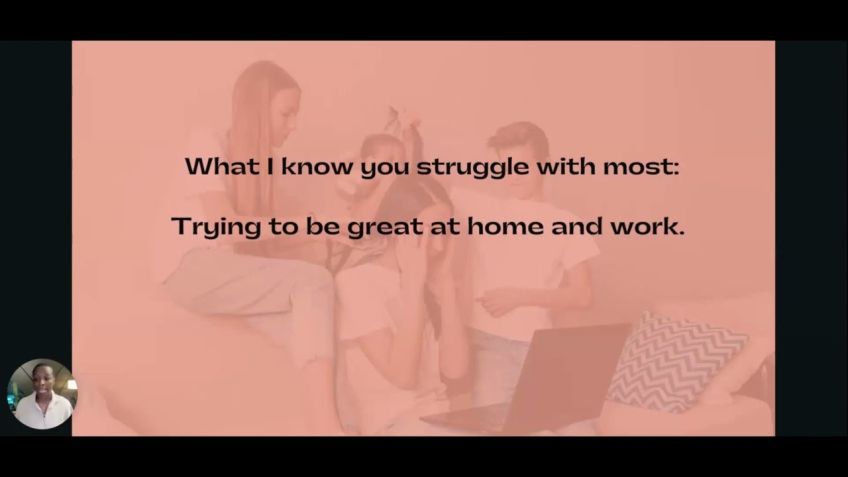Moving from "How Did I Get Here" to "Who Do I Get Here" by Lena Masterson
Making the Shift: From 'How Did I Get Here?' to 'Who Do I Get Here?'
As a woman in tech, I've often found myself wondering, "How did I get here?" In this blog, I'm going to share my journey and how shifting my mindset changed my career prospects. My hope is that through sharing my own experiences, you might find the motivation or renewed perspective you've been seeking.
My Career Highlights
As a veteran with experience in the US Navy, I've held numerous positions in major corporations like AT&T, Lucent Comcast, and Andrew. I was also part of the team that rolled out Xfinity Mobile; I received the Andrew Flash Award and the Comcast Circle of Success. Yet, there's more to me than just my professional achievements - my struggles, my 'fine print,' has shaped me just as much as my successes.
The 'Fine Print' of My Journey
Like many of you, I faced many obstacles and roadblocks in meeting my career goals. My "fine print" includes being raised by a single mother, not attending college until later in life, and becoming a mother at a very young age. Rather than seeing these experiences as setbacks, I came to understand them as the building blocks of my resilience and determination.
Challenges in The Workplace
In my two decades in telecom, I often found myself questioning whether I was good enough, whether I was supposed to be in my role, and if I should have remained where I was comfortable. These doubts colored my experience and eventually, I grappled with Imposter Syndrome. As a result, I knew I had to do something to regain my confidence and overcome my doubts.
Changing Your Mindset
Key to my rejuvenation was shifting my mindset.
One of the most powerful ways I found to combat imposter syndrome and self-doubt was to surround myself with a supportive group. Friends and colleagues reminded me of my past accomplishments, while mentors groomed me for further successes.
Turning Adversity into Advantage
By truly digging into my 'fine print', I began to see my past not as a source of doubt, but instead, a unique qualification for assisting others encountering similar trials. My goal shifted from merely paving my own path to helping others along their own. I stopped asking, "how did I get here" and began asking, "Who do I get here?"
Be an Elevator
When you ascend, why not bring someone else along with you? To those seeking to break into tech or grow their careers, offer your time and insights. Even a brief conversation or introduction can make a world of difference. Employ volunteer programs or hire junior talent who possess transferable skills.
Living by this philosophy of mentorship has changed the course of my career immensely. Whether it's encouraging a colleague at a conference or sharing your journey with others, every small action you take can be a significant stepping stone for someone else.
In Conclusion
In each of us lies a leader capable of transformative mentorship. Whether it's lending your time, making an introduction, cheering others on, or simply sharing your story, never underestimate the power of supporting others. The small steps you take can be a giant leap for someone else. You're not only pushing yourself forward but elevating entire communities.
So, let's start asking, "Who do I get here?" instead of "how did I get here?" You never know whose career trajectory you might change.
Video Transcription
All right, I wanted to thank Women Tech Network for providing me the opportunity to present today. Good morning, good afternoon and good evening to each and every one of you. I am certainly grateful to share a part of your day at this wonderful event.So as Anna said today, I wanna talk to you a little bit about shifting your mindset from how did I get here to who do I get here? All right. So you already know a little bit about me, but I'll go ahead and share some of those highlights again that yes, I was, I was in the US Navy. I am a veteran and I worked for several major corporations as Anna said, like AT&T and Lucent Comcast, Andrew. Um And in those positions, I had the opportunity to lead and be a part of teams where I did some exciting work such as AT&T se 911 installation. I was also part of the coverage plan for President Obama's second inauguration and was a part of the team that rolled out Xfinity Mobile, which is doing phenomenally well, um I am the recipient of the Andrew Flash Award and that was around saving uh ac a client of ours from being hit with a major FCC penalty.
And I have the Comcast Circle of success, which is this guy right here. And I won that as part of the team that rolled out the new product introduction for Xfinity Mobile, where it would be new devices, Android or um apple devices that we rolled out to our customers. I have my MB A and I have eight professional certifications and I'm hoping to get two more done by the end of the year. So I've done some great things, right? And like all of you, I've accomplished quite a lot, you know, I pushed forward. I've done some remarkable work and I've had some great successes, but there's always more than meets the eye. And, you know, I, I share some things that are on my resume or on my linkedin, but there's more to me than just that, you know, more to, than just the highlight reel as I'll call it. Um some of that fine print that we don't always see or doesn't always show up. So let's go ahead and take a look at that, that fine print.
So I'm defining our fine print as our struggles, our difficulties, our roadblocks that are along the way and it's a part of our DNA. It never, never leaves us and like many of you, I face obstacles that challenge me in meeting my roles. Excuse me, my goals uh, my career, career growth and some of my fine print is that my parents were divorced when I was very, very young. And so I was raised by a single mom and she did a phenomenal job and I'm very grateful to her. Another thing is I hadn't gone to college. I went into the military right out of high school. And after getting out of the military, you know, I started working in different industries and at my job and I felt unsuccessful, I felt like I hadn't accomplished anything. Um, looking at my peers and are talking about their college experiences and I, I knew I had to do something. So as a working adult, a wife, a mom, I went back to, back to school and it wasn't until I was 31 that I even got my associates, but I kept going until I eventually received my master's at 40. And then additionally, I have a daughter who's in her mid thirties and I know some of you are doing some math and doing some calculations and others are saying, well, she looks great to be in her sixties. Um, but it's not that big of a mystery.
You know, I had my daughter when I was very young, I was a teen mom. So, um that was another challenge that I, I had to face. And statistically I'm not supposed to be where I am. The odds were against me. But all of these difficulties. All of this fine print, they strengthened me, they made me a go-getter, they made me push harder and keep going and they built up some resiliency in me, but sometimes they also generated some self doubt. So I'll talk about a little bit how my fine print showed up in the workplace. So as Anna shared, I've been in telecom for a extremely long period of time. And for around 15 years of that, I worked in installation services or field operations. And as you see here, I'm showing a cell site where you can see it from the outside and from the inside. And I worked in there for quite some time and the work was great. It was challenging. It was interesting and I had the opportunity to manage tools and materials and inventory and vendors and I installed and tested some of the things that you're seeing there on the right side of the screen um at central offices at BT S locations, which would be at the cell sites.
And I had the opportunity to manage data engineers and tech support engineers and even ran the tower crews that would go out and install those antennas at the top of that monopole that you see on the left. And I went ahead and I forged ahead and excelled in an industry that was extremely male dominated and my fine print was working to my be benefit. Um My career was going extremely well and I was confident in my work. And then unexpectedly, my portion of the business was acquired by another company. So I had to move on from what was familiar and comfortable into something else. So I had the wonderful opportunity to start working at Xin Mobile, but this was on the it side of the house and it was a start up in one of the largest corporations in America Comcast. So I was very excited. You know, I had a lot of experience in telecom in the mobile space. I had hands on as well as leadership experience. So I was gung ho and I was excited and I was like, oh, I'm gonna be a top performer. I'm gonna learn it all. No time. I'll know all the acronyms, the processes, the people. I'm ready to go and about a month into it, believe it or not. I was nowhere where I needed to be. And you know, I said, oh, I gotta do better.
And by month two, I was thinking they have to be saying, why did we hire her? And eventually I became proficient in my role. But as my career continued and I took on more responsibility this cycle of Dell. It, it continued. And so now my fine print was showing up again, but it was uncertainty and doubt. And so this was new for me. I hadn't really experienced this in the past. And I began to question how did I get here. Should I be here? Should I go back to where I was comfortable and what I knew? And am I good enough to be here? And very similar to Aaron's experience who spoke before me, eventually, imposter syndrome showed up for me also. So as you see, we all give imposter syndrome sometime or another, not always at work, but it was something I struggled with. And over 70% of women leaders also struggle with it. And I questioned myself was I worthy to be in this space, was I a leader amongst these other leaders. And I compared myself to others and based off their strength, but not even off of my own strength. So I knew that I had to do something to get back my confidence again. So as a slide, it mindset is everything. So how could I go about becoming a better leader so that I can focus on what I needed to do?
And I, again, I had to shift my mindset and give myself some grace. So I had to remove some of the self imposed pressures that I placed upon myself. Unrealistic expectations. Probably me coming in and learning everything within a month was, was a lot to take on. But I had to understand that I had to to pace myself, but I didn't do it on my own. I had friends, I had colleagues that reminded me of my past successes. I had mentors that groom and groom me and I actually placed myself in a circle of people that pushed me and helped me see the greatness that was in me. I also hired my very first professional coach, which was very important. So I have to shout out Christy Rutherford because she was very pivotal in me, renewing myself. And through her, I've regained that confidence. I was actually able to network with a lot of other women leaders that had similar challenges to me. And this is why women tech network, it is so great. And Anna thank you so much for doing this because this community can make a difference for someone else. And through my coaching, I was able to learn and realize that some of the things that I was facing was coming from my fine print.
Um It was me still working hard to prove myself that I was worthy and overcome some of those obstacles that I had conquered in the past. And so I became more sure and I knew that it was my fortitude. It was my drive, it was my capabilities that earned me my role that I was in. And I no longer questioned whether or not I was supposed to be in my seat. And along with renewing my frame of mind and my self-confidence, I recognized that there were others that had their own fine print, that others did desire to grow their career. But that it would be challenging that that road would be long and windy and hard for them. And so this is why I shifted my mindset from saying, how did I get here to, who do I get here? So this particular slide resonated a whole lot with me because I was working so hard to, to get there. I had my head down and I'm just working and grinding and I never looked up to say I am in a position now to make a difference. I am a leader now. And as a leader, my role is not only to ensure that the work is executed, it is to grow, it is to mentor, it is to sponsor, it is to support. And I did not have many mentors or sponsors earlier in my career.
So it is extremely important for me to, to be that for others to help them get there before I did. As Ada said, um if it took me five years, if I can help someone get there in three, that is my purpose. So I'm very intentional about doing this. So there are many ways to pull someone towards their goal. Like many of you were frequently asked about the work and roles in the tech space. What do you guys do? What role is this? Are there any opportunities that are fit for me? And I believe it's extremely important to take that time out for those that are interested. So I'm always open to make time for others to share information to do an introduction and 15 minutes of your time or an introduction to a willing colleague can be pivotal in someone else's career, helping someone that's new to the space or interested in the space or even showing someone exactly what is in the, with the options of career paths that they may not be privy to because sometimes we just don't know what else, what other options are there.
So, as Anna said, I currently work at Comcast and they have a phenomenal volunteer program for their FTEs and it gives them the opportunity to actually work in other spaces. And with this program, it allowed me to bring in some candidates that on paper would not necessarily be a fit, but they came into our team and we were able to get extra set of hands, but they were also able to get some hands on experience and I was wowed by what a lot of these people were able to do and some of them eventually landed on our team as full time members of our organization.
Another thing that I do is I look at hiring junior talent for people that not necessarily um are in the particular tech space, but they have those transferable skills and with the right support and guidance, they became rock stars. In addition to pulling someone up, you can also be a cheerleader and push someone up. So here I am with the yellow Ar Ar Arrow. Pointing at me and I'm teasing and I'm taking pictures like it's my kid's preschool graduation. But what is that? I'm actually there. I'm supporting a colleague and she was presenting at one of our DEV ops conferences. We weren't on the same team. We didn't even work in the same building. But this was her very first speech and I felt like it was extremely important for me to be there, to support her, to let her know that she was encouraged. So being there as a means of support can also elevate someone to reach their goals. And last but not least do what I'm doing right now. Share your story. It's my journey. So I share it without any ego, without any embarrassment or shame, my successes, my struggles, my trials, my triumphs. They are a testimony of hope and resilience. And I know speaking my truth, including that fine print, it could possibly be the spark or the motivation for someone else that's really trying to reach their career goals. So as leaders in each and every one of us are leaders in our own way.
We have the ability to provide opportunities, counsel and support. It is our duty. So I challenge each one of you or better yet, I dare each one of you to find time for those that are seeking guidance, to make that introduction to cheer on others and push them up and be willing to share your story. And also continually work on who you are trying to get there. Thank you so much. I have my information shared here. I would love to reach out with each and every one of you via email or linkedin Anna. Thank you so much.
Thank you so much, Lena. What a beautiful and a powerful talk. Thank you so much for sharing your experience and the way you champion and support the women in tech. This is very beautiful and you inspired us today with many actionable points. And I think that if everyone would be thinking the way you think would be definitely having more women in tech, I think that everyone who joined us today took some really insightful um you know, ways of how we can support other women. And as you said, make an introduction is it's a 15 minute call. So anything any small thing that we can do, you know, on the way to help others lift others up? So, thank you so much, Lena. I think there was a very interesting comment here and uh from um from Erica who is German tea. She, she shared that she, you absolutely pushed her to the places she never thought she would be, she would see herself. So Erica small tip for you next year, we probably also going to have mentor of the year award, so you can nominate Lena and thank you so much for sharing this had so much beautiful comments out here and everyone is thanking you. And so many things that resonated with our speakers uh uh with our, with our participants, probably speakers too. And so many speakers. And here we have a question, Lena, you mentioned that in just a second. Then you mentioned that you didn't have mentors at the begins.
Who inspired you all along the way? And how did you find the strength in yourself to help others given you had such a challenging life?
Yeah, I would say that um the biggest inspiration was my daughter. So even in the military, because again, I was young when I had her. So I would be running, like just keep running for her, just keep doing it. So that was part of what drove me. Um I'm a Capricorn, so I'm naturally ambitious. Um And I'm a natural giver, I'm very altruistic. That's just my nature. So I'm always probably overly helping. Um So that's just a part of it. And then I, I know my struggle and if I can help someone else get there, it's just innate for me to do that. And I don't lose anything in doing that and helping someone else get there. So I, I just feel like that that is an important.
This is so true and this resonates with me so much what you're saying, you know, something that you say that something that is very innate to you and you don't lose anything. This is so true. And I think that you give so much more and it's so beautiful to see when you see other people rise and you see how you help them. I think there is this special sense of joy and happiness for them, you know, and you that you help them and you are part of their success too. That's something that is very beautiful here. So many beautiful comments. So make sure to drop a note to thank in a message on linkedin or the details, contact details that Lena shared with you people are thanking you. Exactly. Wonderful people are cheering and clapping and celebrating. Thank you. You couldn't have said it any better. So you did a really wonderful job today and I'm very happy that you were part of this uh summit today at this award celebration today and stay with us for the rest of the day. And um please, I'm sure many people would love to connect with you too. So, thank you so much. It's great pleasure to have you with us today.
Thank you so much. Thank you all.





